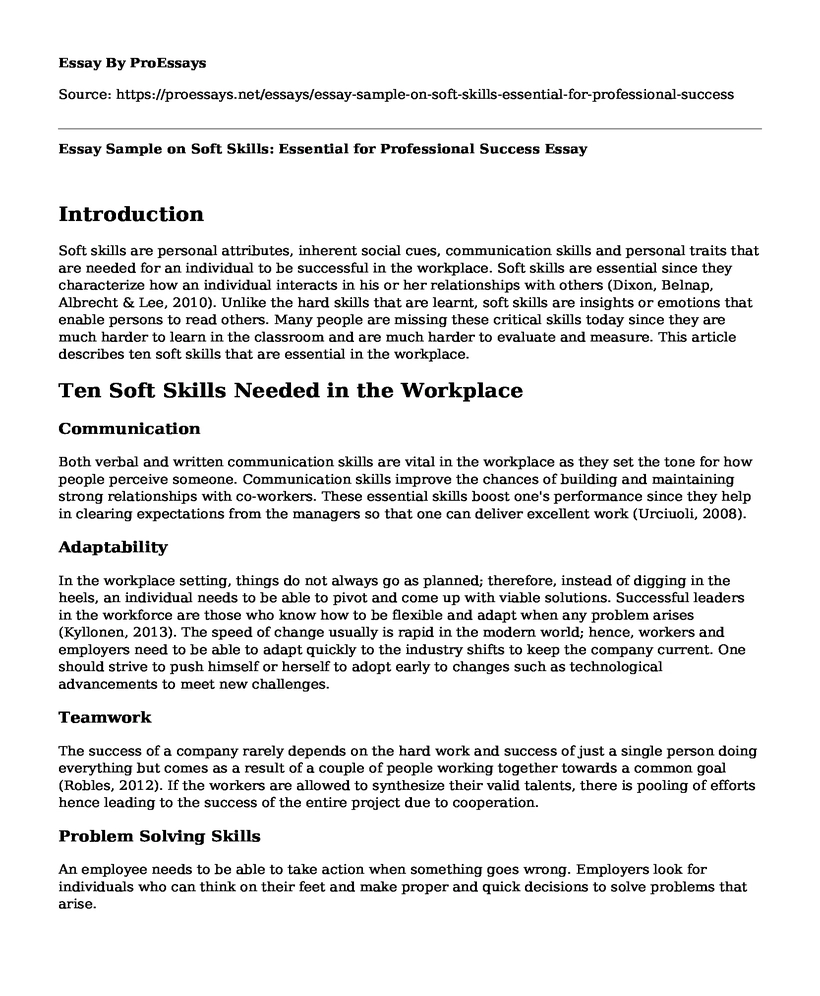Introduction
Soft skills are personal attributes, inherent social cues, communication skills and personal traits that are needed for an individual to be successful in the workplace. Soft skills are essential since they characterize how an individual interacts in his or her relationships with others (Dixon, Belnap, Albrecht & Lee, 2010). Unlike the hard skills that are learnt, soft skills are insights or emotions that enable persons to read others. Many people are missing these critical skills today since they are much harder to learn in the classroom and are much harder to evaluate and measure. This article describes ten soft skills that are essential in the workplace.
Ten Soft Skills Needed in the Workplace
Communication
Both verbal and written communication skills are vital in the workplace as they set the tone for how people perceive someone. Communication skills improve the chances of building and maintaining strong relationships with co-workers. These essential skills boost one's performance since they help in clearing expectations from the managers so that one can deliver excellent work (Urciuoli, 2008).
Adaptability
In the workplace setting, things do not always go as planned; therefore, instead of digging in the heels, an individual needs to be able to pivot and come up with viable solutions. Successful leaders in the workforce are those who know how to be flexible and adapt when any problem arises (Kyllonen, 2013). The speed of change usually is rapid in the modern world; hence, workers and employers need to be able to adapt quickly to the industry shifts to keep the company current. One should strive to push himself or herself to adopt early to changes such as technological advancements to meet new challenges.
Teamwork
The success of a company rarely depends on the hard work and success of just a single person doing everything but comes as a result of a couple of people working together towards a common goal (Robles, 2012). If the workers are allowed to synthesize their valid talents, there is pooling of efforts hence leading to the success of the entire project due to cooperation.
Problem Solving Skills
An employee needs to be able to take action when something goes wrong. Employers look for individuals who can think on their feet and make proper and quick decisions to solve problems that arise.
Conflict Resolution
When people come together at the workplace, there are high chances of development of various conflicts. Therefore, one should be able to resolve issues with co-workers and employers to maintain a proper working relationship with peers and authorities to work effectively.
Leadership
A leader in the workplace needs to have confidence as well as a clear vision which helps him or her influence the co-workers and get them on board with new ideas in the future. Having such favourable leadership skills enables one to gain visibility within an organization which leads to more opportunities for salary bumps and promotions.
Critical Thinking
An employee should be able to look at a situation, properly analyze it and come up with suitable solutions (Klaus, 2009). Companies need critical thinkers who will bring a new perspective and also offer intuitive solutions.
Emotional Intelligence
An employee should have the ability to be aware, express and control their emotions. He or she should also influence and understand the feelings of others.
Time Management
Time is one of the most valuable resources within an organization. At the workplace, one needs to save time through the use of modern technology and doing only the relevant and productive tasks to improve productivity.
Customer Service
The customer service experience can break or make the way a company is perceived. Therefore, an employee should be able to relate to customers well and offer the best services.
References
Dixon, J., Belnap, C., Albrecht, C., & Lee, K. (2010). The Importance of Soft Skills. Corporate Finance Review, 14(6), 35. Retrieved from: https://search.proquest.com/openview/aa5f345bde23cacbf99574378aeef44b/1?pq-origsite=gscholar&cbl=46775
Klaus, P. (2009). The Hard Truth about Soft Skills. HarperCollins. Retrieved from: https://virt11a.secure-wi.com:8443/sitepreview/http/klausact.com/downloads/Release_Klaus_HardTruth_General.pdf
Kyllonen, P. C. (2013). Soft Skills for the Workplace. Change: The Magazine of Higher Learning, 45(6), 16-23. Retrieved from: https://www.tandfonline.com/doi/abs/10.1080/00091383.2013.841516?journalCode=vchn20
Robles, M. M. (2012). Executive Perceptions of the Top 10 Soft Skills Needed in Today's Workplace. Business Communication Quarterly, 75(4), 453-465. Retrieved from: https://journals.sagepub.com/doi/abs/10.1177/1080569912460400
Urciuoli, B. (2008). Skills and Selves in the New Workplace. American Ethnologist, 35(2), 211-228. Retrieved from: https://anthrosource.onlinelibrary.wiley.com/doi/abs/10.1111/j.1548-1425.2008.00031.x
Cite this page
Essay Sample on Soft Skills: Essential for Professional Success. (2023, Feb 12). Retrieved from https://proessays.net/essays/essay-sample-on-soft-skills-essential-for-professional-success
If you are the original author of this essay and no longer wish to have it published on the ProEssays website, please click below to request its removal:
- Research Paper on Mechanical Engineering Career Field
- Public Employment Agencies Essay
- Training of Employees Essay Example
- The Validity of Interviews - Paper Example
- Essay Example on Remote Working: Challenges of Leadership in Virtual Teams
- Essay Example on Internet Use in the Workplace: Analyzing the Ethical Implications
- Essay Example on Material Specialists: Research, Design, & Marketing Requirements







